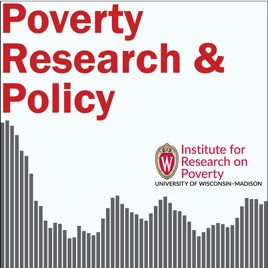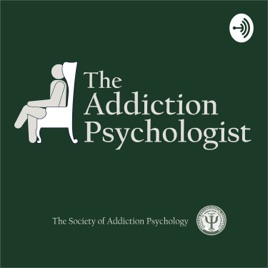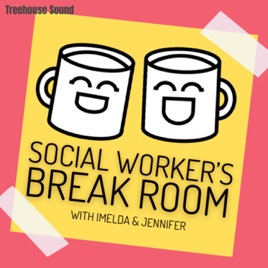
Advertise on podcast: Poverty Research & Policy
Rating
4.9 from
Country
This podcast has
100 episodes
Language
Publisher
Explicit
No
Date created
2016/08/04
Average duration
32 min.
Release period
22 days
Description
The Poverty Research & Policy Podcast is produced by the University of Wisconsin-Madison's Institute for Research on Poverty (IRP) and features interviews with researchers about poverty, inequality, and policy in the United States.
Social media
Check Poverty Research & Policy social media presence
Podcast episodes
Check latest episodes from Poverty Research & Policy podcast
Maretta McDonald on Wealth Inequality and Housing Values of Black Meccas in the New South
2024/02/23
Black Meccas are cities where it appears that Black people are thriving more compared to other places in the US. However, the housing values of Black residents living in these areas are substantially lower compared to their white counterparts, which reveals the presence of wealth inequality even in cities where Black people are supposed to experience a better economic well-being. In this episode Dr. Maretta McDonald discusses the recent paper she co-authored titled, “Wealth Matters: Home Ownership, Housing Values, and the Model Minority Myth of Black Meccas in the New South.”
Maretta McDonald is a 2022-2024 IRP National Poverty Fellow and an Affiliate Faculty of Sociology at Virginia Tech. Her teaching and research focus on racial inequality, criminology, family, gender, and public policy.
more
IRP Book Talk: Luke Shaefer on “The Injustice of Place: Uncovering the Legacy of Poverty in America”
2024/01/26
Where you live can affect the quality of education you receive, your chances of finding a good job, and even how long you might live. In their new book, “The Injustice of Place: Uncovering the Legacy of Poverty in America,” Dr. Luke Shaefer and his co-authors Kathryn Edin and Timothy Nelson create a new way of looking at poverty, called the Index of Deep Disadvantage. Their team spends time in and learns about the communities that have the worst scores, and find that legacies of profound racism, extractive big industry, and crumbling social infrastructure contribute to generations of people struggling to thrive. But even in these communities that face multiple layers of challenge and trauma, there are rays of hope and residents determined to improve their lives and those of their neighbors.
Luke Shaefer is an IRP Affiliate and the Hermann and Amalie Kohn Professor of Social Justice and Social Policy at the Gerald R. Ford School of Public Policy at the University of Michigan. He is a Professor of Social Work, and the Director of Poverty Solutions, also at the University of Michigan.
more
Jessica Pac on the Effects of Child Poverty Reductions on Child Protective Services Involvement
2024/01/08
Child Protective Services (CPS) involvement is common, especially for children experiencing poverty, or who are Black or Native American. About a third of children are subject to a CPS investigation before their 18th birthday, but research shows reducing child poverty could help change this. In this episode, Dr. Jessica Pac discusses the recent paper she co-authored titled, “The Effects of Child Poverty Reductions on Child Protective Services Involvement.”
Jessica Pac is an Assistant Professor of Social Work at the University of Wisconsin-Madison. Professor Pac’s research broadly harnesses applied econometric and data science methods to provide novel insight on mandatory reporting behaviors and the effects of antipoverty and work-family policy supports on maternal employment, safety and health, and infant and child safety and health.
more
William Darity Jr. and Kirsten Mullen on Why It’s Time to Pay Reparations to Black Americans
2023/12/05
Reparations for Black Americans is not a new idea—before the U.S. Civil War had ended, there was a proposal to provide freed Black people with “40 acres and a mule.” That did not materialize, and in the ensuing century and a half, the Black descendants of formerly enslaved people have faced systemic injustices, discrimination, and violence. In this episode, Professor William “Sandy” Darity, Jr. and Kirsten Mullen explain what a meaningful reparations program for Black Americans would entail, how eligibility should be determined, and why the federal government is both the “culpable and capable party.”
Sandy Darity is the Samuel Dubois Cook Distinguished Professor of Public Policy, African and African-American Studies, and Economics at Duke University. He is also an IRP Affiliate. Professor Darity's research focuses broadly on stratification; economics on inequality by race, class, and ethnicity; and the economics of reparations. Kirsten Mullen is a writer, folklorist, museum consultant, and lecturer whose work focuses on race, art, history, and politics. Together they are the authors of "From Here to Equality: Reparations for Black Americans in the 21st Century," and are also two of the editors of "The Black Reparations Project, A Handbook for Racial Justice."
more
Dayna Johnson on How Racism and Poverty Contribute to Sleep Disparities
2023/11/27
Many people suffer from not getting enough sleep from time to time. But for many people of color and those who are living in low-income neighborhoods and housing, additional factors may contribute to chronic poor sleep quality. Those factors can have long-term impacts on their health and well-being, including higher rates of heart disease, diabetes, high blood pressure, stroke, obesity, and depression.
In this episode, Dr. Dayna Johnson shares her research into how experiences of racism, variable work schedules, and neighborhood conditions contribute to sleep and health inequities for African Americans. Dr. Johnson is a sleep epidemiologist and Assistant Professor in the Department of Epidemiology at the Rollins School of Public Health of Emory University. Her research is aimed at understanding the causes and health consequences of sleep health disparities.
more
Tiffany Green on How Charging Dads for the Medicaid Costs of Their Baby’s Birth Affects Child Support
2023/11/08
Wisconsin is one of a few states with a Birth Cost Recovery program, which bills unmarried, non-custodial fathers for the birth costs of their child when the mother is on Medicaid. But the impacts of these policies on the children and both parents have not been studied closely.
In this episode, Dr. Tiffany Green discusses the report that she co-authored titled, “Effects Of Medicaid Birth Cost Recovery Policy Changes On Child Support Outcomes,” which draws on IRP’s Wisconsin Administrative Data Core (WADC). Tiffany Green is an associate professor in the Departments of Population Health Sciences and Obstetrics and Gynecology within the School of Medicine and Public Health at the University of Wisconsin–Madison and is an IRP Affiliate.
more
Jamila Michener on How State Interference with Local Housing Policy Impacts Tenant Health and Racial Equity
2023/10/24
Whether renters have access to safe, high-quality housing has serious implications for health and health equity. Local housing policy often focuses on community residents’ particular needs, yet state law can preempt local ordinances, frequently with detrimental results. In this episode, Dr. Jamila Michener discusses two of her recent papers, “Entrenching Inequity, Eroding Democracy: State Preemption of Local Housing Policy” and "Racism, Power, And Health Equity: The Case of Tenant Organizing.”
Jamila Michener is an Associate Professor of Government and Public Policy at Cornell University. She studies poverty, racism, and public policy, with a particular focus on health and housing. She is Associate Dean for Public Engagement at the Brooks School of Public Policy. Dr. Michener has also been named the inaugural director of Cornell’s Racial Justice and Equitable Futures Center. She is a former IRP Emerging Poverty Scholar Fellow and a current IRP Affiliate.
more
Crystasany Turner on the Strengths, Challenges, and Cultural Assets of Family Child Care Professionals
2023/10/06
Family child care is the care of non-relative children within the providers' home. Thirty percent of family child care professionals are women of color, and oftentimes the cultural assets they contribute to the field of early care and education are diminished or disregarded. In this episode, Dr. Crystasany Turner discusses her research highlighting both the strengths and challenges faced by family child care professionals, future research, and practices to support family child care professionals.
Crystasany Turner is an Assistant Professor of Early Childhood Education in the Department of Teaching and Learning at the University of Wisconsin-Milwaukee. Rooted in Black feminist epistemologies, her teaching and research focus on culturally sustaining and liberatory practices in early childhood education and teacher education.
more
IRP Book Talk: Zach Parolin on “Poverty in the Pandemic: Policy Lessons from COVID-19”
2023/09/07
In his new book, Dr. Zachary Parolin explores three perspectives on poverty—poverty as a risk factor, poverty as an expression of access to current resources, and poverty as a stratifying factor—and how they affected people during the COVID-19 pandemic. He advocates for policy approaches that will both prepare us for the next large-scale economic disruption and provide timely assistance when upheaval occurs, and makes the case for more frequent, and more nuanced poverty measures.
Zach Parolin is an Assistant Professor of Social Policy at Bocconi University in Milan, Italy, and a Senior Research Fellow at Columbia University’s Center on Poverty and Social Policy. His new book, “Poverty in the Pandemic: Policy Lessons from COVID-19,” was published by the Russell Sage Foundation.
more
Manny Teodoro On Increasing Water Affordability through a Permanent Federal Water Assistance Program
2023/08/29
The federal government established a temporary water assistance program to alleviate the burden of water costs on households during the COVID-19 pandemic. Establishing a permanent water assistance program can increase long-term water affordability for households. In this episode, Dr. Manny Teodoro discusses the report he co-authored for the National Association of Clean Water Agencies that assessed options for a permanent federal water assistance program and shares how extending SNAP benefits would help increase water affordability.
Manny Teodoro is the Robert and Sylvia Wagner Professor at the La Follette School of Public Affairs at the University of Wisconsin–Madison. His research focuses on U.S. environmental policy and implementation, as well as utility management, policy, and finance.
more
Svetlana Shpiegel on Measuring Resilience Over Time Among Young Adults with Foster Care Experience
2023/07/12
There are known protective factors that can help young people exiting foster care to thrive by reducing or eliminating the challenges that they often face. By measuring resilience over time, and viewing it as “a state, not a trait,” there is more opportunity to create networks and systems to support these young people as they transition to adulthood. In this episode, Dr. Svetlana Shpiegel discusses her co-authored paper, “Resilient Outcomes among Youth Aging-Out of Foster Care: Findings from the National Youth in Transition Database,” and shares how she and her colleagues assessed sustained resilience, periodic resilience, and sustained non-resilience among young adults exiting care, and why policies like Extended Foster Care are vital.
Svetlana Shpiegel is an Associate Professor at the Department of Social Work and Child Advocacy at Montclair State University. Her research interests include adolescents transitioning from foster care, child abuse and neglect, risk and resilience among vulnerable populations, and early pregnancy and parenthood among child-welfare involved youth.
more
Mina Addo on the Impacts of Non-Standard Work on Retirement Security
2023/06/27
While non-standard work is not a new concept, technology has fueled a recent rise in independent contracting, freelancing, temporary, on-call, and “gig" work. Much of the research on non-standard work has focused on its precarious nature and lower economic security for active workers. In her recent paper, "The Retirement Implications of Non-Standard Work," Dr. Mina Addo turns her attention to the impacts on retirement security for the large numbers of U.S. workers are participating in non-standard work alone or in addition to traditional employment.
Dr. Addo is an IRP National Poverty Fellow in residence at the Office of Planning Research and Evaluation in the U.S. Department of Health and Human Services. She completed her Ph.D. in social welfare at the University of Pennsylvania School of Social Policy and Practice and is a qualitative researcher with experience with mixed methods studies. This paper was funded through a 2022 Junior Scholars and Training Research Award from the Retirement and Disability Research Center of the Center for Financial Security at the University of Wisconsin–Madison.
more
Podcast reviews
Read Poverty Research & Policy podcast reviews
Thai 274 FHA
2021/11/17
Great show
I listen to this show religiously. As a member of the nonprofit sector, it’s really important to hear this research broken down in an accessible and u...
more
Eric B G
2019/03/24
So needed
As someone who works in the non profit sector helping to eliminate poverty everyday, it is so incredibly helpful to have real research available. The...
more
Podcast sponsorship advertising
Start advertising on Poverty Research & Policy & sponsor relevant audience podcasts
You may also like these social sciences Podcasts

4.6
803
256
گوش نیوش های دکتر شیری
Dr. Shiri

4.8
151
181
Razib Khan's Unsupervised Learning
Razib Khan

4.8
569
163
The Science of Everything Podcast
James Fodor

4.6
4515
383
The Brohio Podcast
Aliens, Conspiracy Theories, Paranormal, Famous Murders, Cryptozoology, Strange Occurrences, Monsters, UFOs, True Crime, Demons, Occult, Urban Legends, Comedy

4.5
33
50
The Addiction Psychologist
Samuel Acuff and Noah Emery

4.9
17
203
The Litigation Psychology Podcast
litpsych

5
5
73
Trumanitarian
Trumanitarian

4.3
64
86
悬疑案件 | 扑朔迷离的案件合集
怡楽电台

5
32
36
Social Worker's Break Room
Treehouse Sound Inc.

4
20
76
Aporia Podcast
Aporia Magazine



